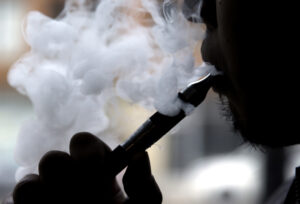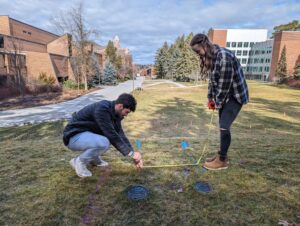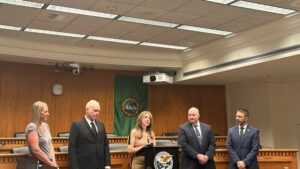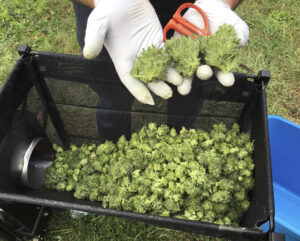SPOKANE — A homeless woman peered into a cardboard box full of sealed paper bags with PERIOD. stamped on each one.
“Are those sandwiches? Can I have one?” she said, a half-smoked cigarette between her lips.
“No, sorry these are menstrual products,” said Aydan Jane Garland-Miner, president and founder of the WSU Period, a student-led chapter of a national nonprofit. “Did you need some?”
Many homeless and women shelters in Spokane focus on food and overnight services but lack the supply of menstrual products to help all those in need, said volunteers and residents. At the Crisis Shelter for Women & Children, for example, the top needs include tampons, among other normal necessities, according to their website.
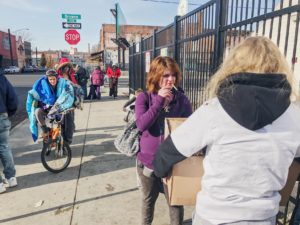
Aydan Jane Garland-Miner, president and founder of the WSU Period chapter, leads group members on a trip to Spokane to distribute feminine hygiene products. | Photo by Lindsey Jensen
From homeless shelters to jails to public education systems, menstrual products are often in short supply — and incredibly expensive for low-income menstruators. In Washington state, period products can cost upwards of $12, and the state government deems feminine hygiene products as luxury items that are taxed. While products like Viagra and hair conditioner are exempt from sales tax, pads and tampons are taxable in Washington — one of 33 states nationally that taxes the products.
In Ohio, female legislators teamed up with college activists to pass a bill to exempt sales tax on feminine hygiene — an idea that failed four times previously.
“if you value making sure people who menstruate are able to go to work and school and participate in their communities then this is a good common-sense solution to that problem,” said Rep. Brigid Kelly, D-Cincinnati, who helped lead the legislative effort.
In Washington state, Rep. Lynda Wilson, R-Vancouver, joined forces with Democrats to remove the tax, which adds 6.5 cents to every dollar of cost. But eliminating the so-called “pink tax” would lead to a loss of $4.5 million in state revenue, and the proposal has failed repeatedly.
That may not seem like much, but the average woman will need 16,000 tampons in their lifetime, experts say.
Low-income and young women are most at risk. At the Crisis Shelter for Women & Children in Spokane, resident Tiffany Knieriem said menstrual products are entirely donated and are dispensed to people on a first-come-first-serve basis. At county jails in Washington, women sometimes fight for limited products or they can only purchase them with money earned after working for seven days in jail.
In Whitman County Jail, inmates are well taken care of when it comes to their periods, inmate Ashley Green said. Upon arrival they are given boxes of products. If menstruators run out it is easy for them to contact guards and get access to new products.
“The guards here are really helpful. Typically, if I need something the guards will help me in like an hour,” said Green, who is in jail for allegedly possessing heroin and suboxone.
Stephanie Lawyer said when she first went to jail, “it was sort of a taboo thing.” Lawyer says while she has been to over thirty jails herself that being around all women it’s natural and everyone understands the womanly menstrual flow.
“A lot of people try and help. Females are really understanding of each other and it makes it easier on each other,” said Lawyer.
Lawyer noted that while most women have each other’s back, it can be hard when the guards aren’t accommodating and the overall “culture” is rough.
On average, an inmate will typically earn around 14 cents on the dollar per hour. When products are not provided, they are forced to use what they earn to purchase products.
Groups like Washington’s State University’s PERIOD. chapter are looking into other efforts to help expand knowledge and rights for menstruators who are incarnated to help earn free products for those who may not have them.
Almost one million menstruating women have been addressed nationally through Period’s product distribution since established in 2014, according to the international Period website.
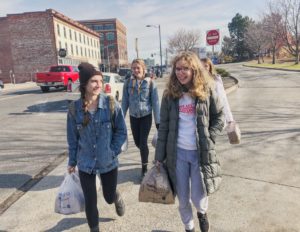
Aydan Jane Garland-Miner, president and founder of the WSU Period chapter, leads group members on a trip to Spokane to distribute feminine hygiene products. | Photo by Lindsey Jensen
For Garland-Miner and other volunteers, her favorite part about these trips were interacting with real people, she said the amount of kindness and gratitude she receives always surprised her.
“Most people seem stoked to have us distributing menstrual products, whether they menstruate or not, which is great considering the stigma against menstruation,” said Garland-Miner.
On a trip to shelters this fall, Garland-Miner and Alexa Branch, vice president of Period. at WSU, strategized where and whom they would help next.
“Working with Aydan is wonderful. We have similar organizational methods, which works out nicely,” said Branch.
With over 600 registered campus chapters across the U.S. and in 30 other countries, the WSU chapter established last January and is one of 22 chapters in the state of Washington, according to the international Period website.
The WSU Period. chapter will go to Guatemala this spring break to distribute feminine hygiene products to various villages. Ana Maria Rodriguez-Vivaldi and Kathy Beerman, co-directors of the Hearts in Motion faculty-led program in Guatemala, said it will be the first time the Period. chapter will be involved.
Rodriguez-Vivaldi and Beerman said villagers line up for health services in past trips. They see the distribution of feminine hygiene products having the same effect.
Four out of 40 students on the trip are helping Branch with this project. They plan to distribute reusable pads as well as women’s vitamins and reusable hand towels to village women and young girls.
Branch said she plans to reach out to multiple reusable pad companies for donations. She’s hoping to bring about 200 pads.
“I honestly don’t know how people are going to take the questions about menstruation because from what we understand, it’s not talked about down there, I’m assuming it’s probably going to make people uncomfortable,” Branch said.
Garland-Miner said information is the first step in addressing this issue not only in the U.S. but internationally. She said she thinks Branch could spark some inspiration in Guatemala to start their own Period. chapter.
For more information on this report visit: periodreport.weebly.com
